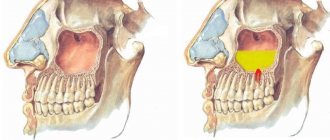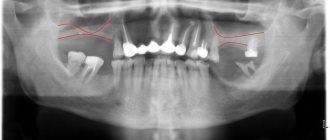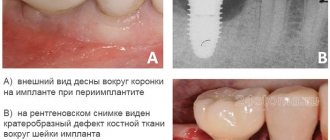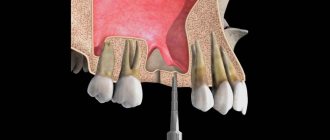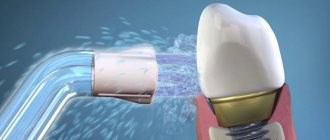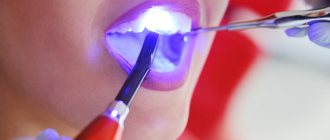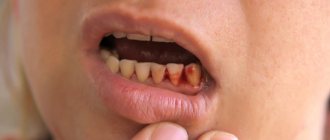How to avoid complications after implantation
- How to behave after surgery
- Postoperative nutrition
- How long does it take to heal?
- How are sutures removed?
- Postoperative complications
- Swelling after dental implantation
- Inflammation and temperature
- Numbness
- Antibiotics after implantation
- Simultaneous (immediate) implantation
During implantation, the dentist places an artificial tooth root into the gum, which then becomes the basis for a removable or fixed denture. The operation is always complex and multi-stage, and to achieve success it requires the joint work of the doctor and the patient. Even at the current level of development of medicine, it is impossible to completely guarantee the absence of complications: aching pain, hematomas, swelling, bleeding, infection, fever. It is also possible for the implant to fail.
But if you follow the recommendations, it will be easier to avoid complications, and the implant will take root faster.
So, what to do after dental implantation to quickly relieve the consequences of surgery and the best healing of the gums?
Reminder after sinus lift
When will the swelling go down after a sinus lift?
The swelling usually disappears within 5-6 days. Ice compresses will help relieve swelling faster after a sinus lift.
Can I drink alcohol after a sinus lift?
No, drinking alcohol is not recommended for at least the first two to three weeks after surgery.
What should be the diet after sinus lift and implantation?
Too hot, spicy and hard foods should be avoided.
Is it possible to smoke after a sinus lift?
No, in the first month it is better to abstain from cigarettes altogether.
Is it possible to fly after a sinus lift?
No, it is better to limit flights for at least two weeks (for an open sinus lift - for a month).
Why should you not sneeze after a sinus lift?
Coughing and sneezing creates excessive pressure on the maxillary sinuses.
How to breathe and cough after sinus lift?
Breathe calmly and evenly, cough and sneeze as carefully as possible and with your mouth open.
Do I need to take antibiotics after a sinus lift?
If the attending physician insists on this, then it is necessary. In addition, after sinus lifting, medications are used that relieve pain, as well as antiseptic and anti-inflammatory drugs.
How to behave after surgery
Doctors give the following recommendations after dental implantation:
- Do not use irrigators. Any treatment of the oral cavity should be as soft and gentle as possible. Oral baths are indicated. Active rinsing with antiseptic solutions is prohibited before the sutures are removed.
- Brush your teeth with gentle movements using a soft brush (your doctor will recommend a brush). You can use dental floss and superfloss. But it is better to clean your teeth directly at the operation site only with a cotton swab dipped in a 3% hydrogen peroxide solution.
- Avoid involuntary sneezing, coughing and blowing your nose, especially if the implantation is associated with sinus lift surgery. A sharp increase in pressure in the maxillary sinus can lead to mechanical damage to the bone tissue and displacement of the implant.
- Avoid extreme temperature changes. For this reason, it is better not to visit baths and saunas.
- Air travel can also be harmful because rapid changes in altitude make it difficult to avoid a surge in pressure in the ear-nose-throat system.
List of prices
| Service: | Price: |
| Mis (Israel) | 27,000 rub. |
| Alpha Bio (Israel) | 26,000 rub. |
| Noris (Israel) | 25,000 rub. |
| Adin (Israel) | 25,000 rub. |
| Xive (Germany) | 45,000 rub. |
| Impro (Germany) | 31,000 rub. |
| Ankylos (Germany) | 47,000 rub. |
| CSM Implant (Korea) | 27,000 rub. |
| NeoBiotech (Korea) | 25,000 rub. |
| Euroteknika (France) | 31,000 rub. |
| Anthogyr (France) | 27,000 rub. |
| Biotech (France) | 21,000 rub. |
| TBR (France) | 21,000 rub. |
| LIKO (Russia) | RUB 18,900 |
| IRIS (Russia) | 18,000 rub. |
| Rusimplant (Russia) | 19,000 rub. |
| Konmet (Russia) | 21,000 rub. |
| Express implantation | 25,000 rub. |
| Single-stage implantation | 25,000 rub. |
| The doctor's consultation | free of charge |
| Computer examination of the jaw | free of charge |
| Panoramic shot | free of charge |
| Tomography of the jaw | from 1,400 rub. |
| Installation of the healing abutment | 2,000 rub. |
| Open sinus lift | 40,000 rub. |
| Bone grafting (by transplantation method) | 30,000 rub. |
| Guided bone regeneration | 15,000 rub. |
Postoperative nutrition
Avoid hot foods until the anesthesia wears off. If you eat or drink something too hot, you can accidentally burn your gums because they won't feel the temperature.
In the first two days, do not drink coffee: it increases blood pressure and this can lead to bleeding. This also explains the requirement to exclude alcohol and smoking.
Within 10 days after surgery, to strengthen injured bone tissue, include calcium-containing foods in your diet: cottage cheese, kefir, yogurt.
Do not eat salty, spicy, very hot or frozen foods, as well as rough foods - crackers, nuts. The load on the teeth should be reduced as much as possible, so you should avoid foods that require careful active chewing - for example, tough meat.
The best option for a postoperative diet is pureed, semi-liquid, moderately warm food (soups, cereals, smoothies), or finely chopped.
Menu
The menu of the person who has the pin installed must be balanced. It is important to follow the recommendations of specialists and not eat rough food. It is better to give preference to soups, pureed soups, porridges, grated vegetables and fruits, soft cheeses, cottage cheese, yogurt, kefir, etc. The rate of bone tissue restoration will depend on the sufficient amount of dairy products consumed.
All food should be rich in vitamins and minerals, and it is better to completely avoid additives that are harmful to the body. Only careful attention to your body will help it recover as quickly as possible.
You will have to give up sweets and carbonated drinks for a while; it is better to replace them with fruit juices or plain water. A person with implants must consume plenty of fluids. It is recommended to abstain from sour, spicy, and alcohol during the rehabilitation period. If the patient is taking antibiotics, then any alcohol-containing drinks are strictly prohibited. This is explained not only by the fact that alcohol has a detrimental effect on the body, but also by the fact that it reduces the effectiveness of the medications taken.
How long does it take to heal?
Bone tissue and gums heal after dental implantation on average from three to six months, and the period is different for the upper and lower jaws. The lower jaw will heal in three to four months, but the upper jaw will take longer: four to six months. This is due to the greater bone density of the lower jaw.
Sometimes the healing rate deviates from the average time frame, because it depends on the individual characteristics of the patient’s body: the speed of regeneration, the strength of the immune system, the pain threshold. Even such factors as gender, age, lifestyle, diet and daily routine of the patient are important.
In any case, recovery after surgery takes some time. Following medical recommendations will help protect yourself from complications during healing.
How are sutures removed?
Sutures after dental implantation are usually removed 10-14 days after surgery, unless otherwise indicated. Throughout this period, surgical sutures need careful, delicate handling. After suturing, there may be some discharge or slight pain. It is permissible to use painkillers (Nise, Ketanov or another remedy recommended by a doctor).
Modern dentistry uses strong synthetic threads that do not break even with active chewing of food, so dental sutures now rarely come apart. But suture dehiscence is still possible - however, it is most often associated with violations of medical recommendations, most often with mechanical damage to the operation area.
Removal of sutures does not require anesthesia and is completely painless.
How much does postoperative care cost on average in Moscow?
| Name of service | Cost, rub. |
| Treatment with oral medications | |
| Ascorbic acid | 24 |
| Analgin | 50 |
| Ketanov | 60 |
| Linex | 220 |
| Voltaren | 230 |
| Amoxiclav | 310 |
| Flemoklav | 350 |
| Erius | 560 |
| Calcium D3 nycomed | 568 |
| Nimesil | 700 |
| Local treatment | |
| Chlorhexidine | 16 |
| Tantum Verde solution | 280 |
| Betadine solution 10% (120 ml) | 280 |
| Solcoseryl | 370 |
| Professional teeth cleaning | |
| Professional hygiene with ultrasound | 2000 |
| Teeth brushing using the Air Flow method | 3500 |
Postoperative complications
The most common complications after dental implantation are:
- Pain syndrome. The norm is mild soreness of the gums in the area of implantation for 1-2 days. In cases where severe pain does not go away even after taking the generally recommended painkiller, you should consult a doctor, because this is most often a symptom of a complication.
- Inflammation.
- Seams coming apart.
- Hemorrhages. After surgery, ichor often separates from the gums, the amount of which quickly decreases and disappears. It is enough to remove it with cotton swabs. But if the bleeding becomes more intense, you should consult a doctor immediately.
There are also complications such as inflammation of the sinuses, peri-implantitis (inflammation of the tissue around the implant, leading to destruction of the supporting bone tissue), mucosal hyperplasia (pathological growth of the mucous membrane in the area of the implant), damage to the implant and prosthesis.
Types of materials for sutures in implantology
Dental practice uses several types of suture materials. All of them are classified into self-absorbable and non-absorbable.
Absorbable include
- Catgut;
- dexon;
- vicryl.
Catgut has been used for more than a century and is a classic. The threads dissolve in about two weeks due to the action of phagocytosis and enzymes. The disadvantage of the material is the ability to provoke tissue inflammation due to foreign proteins contained in its composition. The use of catgut during implantation is not recommended.
Dexon and vicryl are synthetic materials. The active substance of the first is polyglycomic acid, the second is polylactin. Resorption is promoted by hydrolysis. The period of complete dissolution takes about a month. Suppuration practically does not occur when using these threads.
Non-absorbable threads
- Silk;
- woven polyester;
- monofilament.
Silk , consisting of silkworm proteins, is often used by surgeons, but not for fixing bone grafts. It has one drawback - sometimes an inflammatory process develops in the area of the sutures. Braided polyester threads serve their purpose well, without complications.
Monofilament sutures with good mechanical properties are most suitable for implantology They do not cause reactions and are suitable for prolonged contact with the oral mucosa. The only negative aspect of the material is the rough ends. The problem is solved by fixing them with a special bandage.
Swelling after dental implantation
In the first three days after implantation, swelling may occur in the gum tissue. This is the body's natural reaction to surgery. Most often, a tumor is an indicator that blood is actively flowing to the operation site.
But if you want to avoid the discomfort caused by swelling, you can reduce the risk of its occurrence. To do this, in the first two days, apply cold to the operation site: for 5-10 minutes with breaks of 20 minutes. Do not apply ice directly to the skin; it is best to wrap it in a towel. In rare cases, the tumor will require the use of antihistamines, antibiotics (to prevent infection) or treatment with antiseptic solutions.
It will also help to avoid swelling by eliminating sudden stress loads on the body: physical overload, hypothermia, overheating.
Inflammation and temperature after dental implantation
Your body may also react to surgery with a low-grade fever, that is, an increase in general body temperature to 37°C. Even if the temperature stays within these limits for several days, this will remain the norm. You should be wary only when there is a persistent increase in temperature to 37.8-38°C. In this case, it almost certainly means inflammation, which requires immediate intervention (for example, in case of peri-implantitis, this should be sanitation of abscesses, bone regeneration, as well as professional oral hygiene).
In this case, you should not delay visiting a doctor: the inflammation can not only worsen on its own, but also lead to implant rejection.
How to brush your teeth at home
The procedure for caring for restored teeth should become a daily habit. Caring for artificial teeth is not difficult, the main thing is that hygiene procedures are carried out correctly and regularly. Caries cannot form on prosthetic teeth, but insufficient hygiene increases the risk of developing periodontal disease, which can lead to peri-implantitis and rejection.
Hygiene procedures are carried out twice a day and consist of 3 stages:
- cleaning teeth and interdental spaces with a brush or brush ;
- floss application;
- irrigation or rinsing.
You can use a regular or electric toothbrush. Particular attention should be paid to the lingual side of the teeth, interdental spaces and protruding edges of the implant. To do this, you can additionally purchase monotuft brushes and brushes.
Proper brushing of teeth, stages:
- Using sweeping movements, clean the inside and outside of the teeth, moving from the gums to the cutting edge.
- Treat the chewing area using back and forth movements.
- Clean the abutment using a back-and-forth motion and then a sweeping motion.
- Massage the gums using circular movements with the brush.
- Treat the interdental spaces with floss or a brush.
- Afterwards, rinse your mouth with water, solution, or use an irrigator.
Irrigation allows you to remove contamination from the surface of the crown, from deep pores and interdental spaces, where conventional rinsing is ineffective. Plus, the irrigator massages the gums, improving blood circulation in the tissues.
Irrigation technique:
- the stream of water must be directed at an angle of 90 degrees to the surface of the gum;
- the procedure is carried out sequentially, dividing the dentition into segments;
- the position of the head should allow the liquid to flow out;
- the interdental spaces and the area at the base of the crown are processed a little longer;
- optimal standard or soft cleaning mode;
- To improve the hygienic effect, rinses or antibacterial solutions can be used for irrigation.
Numbness after dental implantation
For most patients, anesthesia wears off within four to five hours after implant placement. Then oral sensitivity should return. If numbness persists after this period, then you have cause for concern because it may indicate nerve damage. This is only possible when the operation was performed on the lower jaw, because there are no large nerves in the upper jaw.
Other symptoms of mandibular nerve injury are lack of facial skin sensitivity, excessive salivation, and difficulty speaking and eating. Timely diagnosis will help to establish the nature and extent of the damage and manage the treatment with medications rather than surgical methods.
Rehabilitation period after open sinus lift
The sinus lift procedure is divided into open and closed. An open sinus lift involves a more extensive surgical procedure. During the operation, an incision is made on the side of the jaw and a gum flap is peeled off, as well as a small hole is drilled into which bone grafting material is placed. After completion of the procedure, the material engrafts over several months and only after that the doctor installs the implant. A closed sinus lift is less traumatic: the doctor lifts the bottom of the maxillary sinus and places bone material through a drilled hole, which also serves as a bed for the implant. The operation can be carried out simultaneously with the installation of the implant, however, for such a manipulation several factors must coincide at once, so in the vast majority of cases an open sinus lift is performed.
Despite the difference in techniques, rehabilitation and restrictions after surgery are almost the same. Closed sinus lift is less traumatic, and the rehabilitation period after open sinus lift lasts somewhat longer, however, all the basic restrictions and rules of care remain approximately the same for both procedures.
Antibiotics after dental implantation
For preventative purposes, the doctor prescribes a course of antibiotics after surgery. In most cases, this is inevitable, since surgical trauma, even with the modern level of development of medicine, carries a high risk of infection. Therefore, it is better not to ignore antibacterial drugs prescribed by a doctor if you do not want to additionally place unnecessary burden on your immune system to fight infection.
Most often, the course of antibacterial therapy does not exceed 7 days, and broad-spectrum drugs are prescribed - amoxicillin, amoxiclav, cephalosporins. They are characterized by low toxicity and have long proven themselves to be well tolerated by the human body.
Simultaneous (immediate) implantation
This prosthetic method is a one-stage implantation. In this case, the dentist removes the patient’s damaged tooth and immediately installs an artificial root.
Implantation immediately after tooth extraction is only possible if the bone tissue has sufficient volume to accommodate the implant - for example, if the tooth was damaged or lost in an accident. But tooth loss much more often occurs due to diseases when bone tissue is lost. Therefore, this method is not always available.
Dental implantation is an achievement of modern dentistry that allows you to restore lost teeth and use them for the rest of your life. And if you carefully follow your doctor’s recommendations, your smile will always bring joy to your loved ones!
